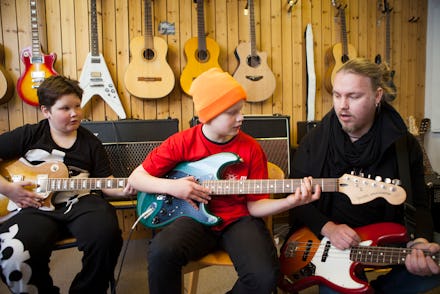One Country Is Giving Kids a Music Education That U.S. Children Could Only Dream Of

This week, when Jessie J, Nicki Minaj and Ariana Grande's "Bang Bang" was released, the Internet erupted. Right away, it sounded like a hit. That's because it was written by Max Martin, the legendary Swedish songwriter who has written 17 number one hits since 1999 alone. But he doesn't think there's anything too special about it. When asked how he became the undisputed king of pop music, he just said: "I have public music education to thank for everything."
Specifically Swedish public education. Martin — like Robyn, The Knife, Little Dragon, Avicii and countless others — grew up in Sweden, home to the greatest music education system in the world.
The Swedish music education system should be the envy of all industrialized nations. As Pacific Standard reported earlier this year, the Swedish government has offered high-quality music education for nearly all of its citizens in subsidized after school programs since the 1940s. These music schools, or "culture schools," (the word can be translated both ways) and traditional academic schools are kept largely separate; although collaborations between teachers from both are frequent, such as in school bands and orchestras. Fees are becoming more common these days, but around 30% of kids receive free education, and fees only run up to about $100 per semester. Schools provide genre-specific training in pop, rock, classical and most recently mixing and recording, and also allow students to rent any instrument they please for a small fee.
This is huge for kids across the country. According to a study by Marja Heimonen published in the ACT Journal, the aims of the Swedish system are not to identify, select, and train a select group of musicians for possible future professional careers (like our musical education and conservatory system), but to offer the gift of music to every child. It is a way to promote Sweden's democratic ideals by ensuring that every student has an equal opportunity to share in culture and cultural creation. The government's official stance still has a social control aspect as well, but a far less austere one — if the kids focus on playing music, they won't be "out on the streets" drinking or doing drugs. Eventually, then, these kids can write smash hit songs for Americans about what the young Swedes were missing while they got ridiculously good at music.
The variety and strength of Sweden's programs puts America's to shame. Our programs are constantly underfunded. Music education is a mark of class in our society — you can have it only if you afford it — but it's no longer a public good. School districts in Florida, Kansas and Arizona have majorly cut back on music education programs. In 2009, California did the same — slashing $109 million from music ed and closing music departments across half of California's 10,000-plus public schools. In New York City, up to 85% of public school students have not received reasonable musical instruction by high school.
But imagine what our country could do with a musical education program like Sweden's. Music education has been shown to provide enormous cognitive benefits to children as they grow up. It also helps them stay more engaged with their other academics and within their communities. Sweden currently outperforms the U.S. on OECD's International literacy, math and science tests, and Swedish citizens have more faith in their communities and report more happiness than Americans. It's hard to say how much of this is directly attributed to Sweden's thriving musical culture, but it's undoubtedly a strong contributor.
That's because music is an essential art, and it's ability to inspire and strengthen communal bonds can be astronomical. This isn't something we, as a nation, can't afford to overlook any longer.